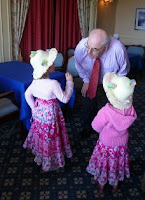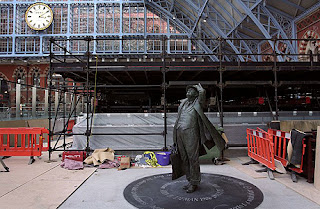As I have noted before in these blogs as I get older the more anti war and military I become. War films on TV are an anathema, pathetic men in uniform become to me even more foolish and patriotic and jingoistic flag waving hides, I believe, a basic flaw in the national character.
But, having said that, I can't resist the gentle humour of Dad’s Army! It is my one concession to the military. Perhaps it looks a little dated now but I can’t resist the re-runs and have them all on DVD anyway. It isn’t just Dad’s Army – other similar sitcoms from years gone by – Fawlty Towers, Rising Damp, Butterflies, The Good Life, Only Fools and Horses and the rest can always raise a smile.
What I like about these programmes is that although they are sitcoms – not real – as with all good comedy they are acutely observed. We can all recognise ourselves, or people that we know in the characters. We’ve all met pompous individuals like Captain Mainwaring. We've all seen Del Trotter in the pub or down the market. We've all heard the prejudice and moans from someone like Rigsby in Rising Damp. The essence of good comedy is that we can relate to it – that is what makes it funny – it gently prods us and makes fun of our own little foibles. I know that I could easily become Rigsby or on another day I could be Captain Mainwaring – indeed, I think my wife already thinks that I am!. And perhaps it is good that it reminds us not to become too pompous or too prejudiced – lest we turn into Mainwaring or Rigsby. We’ve all see Basil Fawlty type people and every single one of us has the capacity to behave like him – but seeing him on screen perhaps serves as a little warning to us all.
I thought about this last week while in Devon – and indeed came to the conclusion that Dad’s Army was even nearer reality than even I had previously thought.
 |
| Village Green |
But, back to Dad's Army!
At the end of the village, facing the sea are several items relating to the 2nd World War – an observation post and the like. There is also an informative tourist information board explaining that during the War the local Home Guard were responsible for the protection of the estuary and for keeping watch for a possible enemy attack or invasion. Just like Captain Mainwaring’s platoon at Walmington-on-Sea! All interesting stuff but the best bit is the copy of a list of instructions to the Guard in the event of an invasion. Their mobilisation orders.
 |
| Tourist information board. |
So what did the orders say? (and I copy straight from them):
In the event of an invasion or danger No 17 Platoon (Gunners) will:
- Ring Mr Holland (Teignmouth 679) – ask him to give a message to Gunner Tanner who is his next door neighbour.
- Gunner Tanner then proceeds to Mill Lane and warns Mr Burgess who has written instructions giving names and addresses of men he has to warn.
- Gunner Tanner then warns Gunner Harvey who has written instructions and will warn all outlying Teignmouth men on his motor cycle.
- Ring Sgt. Bent (Shaldon 14) and ask him to warn Shaldon men via various NCOs
- Ring Commercial Inn (Bishopsteignton 285 – Mr Mole). Ask him if he would be good enough to send a message to Sgt Mitchell.
- Sgt Mitchell has instructions to warn Gunner Burgoyne
- Ring Gunner Daunt (Teignmouth 512) – he has names and addresses of three men.
- Ring Gunner Coysh (Teignmouth 229) who has written instructions giving name and address of one man.
- Ring Battery (Shaldon 165) and ask Capt. Gowan for the van to make a few trips to West Teignmouth Church and back. All the men have been advised that the van will be doing these runs and they will be picked up on route and conveyed to Battery.
- Shaldon men will make their own way to Battery.
- On mustering all men will report to the Battery Office and sign Attendance Book
- A list of operational duties will be found in the Battery Office.
 |
| Mobilisation instructions |
But, whatever, as I read the notice, I could just picture Lance Corporal Jones saying 'Don’t Panic!' I could see in my mind’s eye Shaldon’s equivalent of the young Pike doing something wrong and incurring the wrath of Shaldon’s Captain Mainwaring - 'Stupid boy' he would say! I could almost hear Shaldon’s equivalent of Private Walker – the 'spiv' – as he stood in the bar at the Commercial Inn doing a black market deal saying 'OK, in a minute, I’ll catch you up when I’ve finished my beer and sold these nylons!'
Wonderful stuff!
But, whatever my views on the military, I found it all quite humbling that these men – ordinary people – accepted the orders in the spirit that they were meant to protect their country and their way of life. Was life perhaps simpler then – or have we lost something. We all laugh at Captain Mainwaring’s pompous outlook, we mock the upper class Sgt. Wilson or the dour Scottish coffin maker Private Frazer and the doddery medical orderly Private Godfrey – but in reality these were the men of Shaldon and thousands of similar places throughout the land. And when the chips were down they did it right! I’m not sure we would act as wisely or as well today.
As I stood on the front looking out over the estuary and out to sea I was reminded of Nelson's simple but pointed message to his fleet before Trafalgar 'England expects that every man will do his duty'. I'm not a military man but when the chips are down that is what it is all about - and whoever wrote the orders for the men of Shaldon all those years ago, clearly expected that they would all do as Nelson had commanded, a century and a half earlier.
 |
| Looking back across the estuary |
As I stood on the front looking out over the estuary and out to sea I was reminded of Nelson's simple but pointed message to his fleet before Trafalgar 'England expects that every man will do his duty'. I'm not a military man but when the chips are down that is what it is all about - and whoever wrote the orders for the men of Shaldon all those years ago, clearly expected that they would all do as Nelson had commanded, a century and a half earlier.
Go to Shaldon – worth the trip – and the notice reminds you of a simpler but perhaps rewarding time!




































